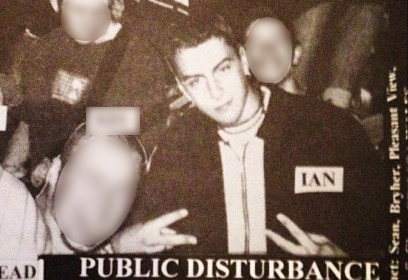I always wanted to write to Ian Watkins in prison, but never did. I’m not a vulnerable young woman, so he probably wouldn’t have replied anyway. And even if he had, would I have really gained anything from the correspondence? Did I really need his personal reflections on his crimes, which include the attempted rape of a baby, and perhaps constitute the most perverse catalog of offending known to have been committed by a “celebrity,” even at this moment when the public fall from grace has become an international sport?
Following his death on Saturday at 48, his throat reportedly slashed with a makeshift blade, the possibility of any kind of answer is gone. So perhaps I can let go of this need to understand Watkins, which has haunted me for the 12 years since I covered his court case.
I was on the press bench when he was sentenced to 29 years in prison with a further six years on licence. I used shorthand to take notes as the judge said that Watkins and his co-defendants, two mothers whose children he’d abused, had “plunged into new depths of depravity.” This quote appeared in newspapers and on websites around the world, but I can’t take much credit for that; I wasn’t the only journalist filing copy for the wires, where the vast majority of media outlets get their stories from. Although I’m pretty sure I was the only reporter there who’d once worn a Lostprophets hoodie to school and still had a CD copy of The Fake Sound of Progress lying around somewhere.
It should go without saying that any compassion here belongs to Watkins’ victims—when sentencing, the judge explained how the baby boy in the case was “likely to have lifelong psychological difficulties coming to terms with the enormity of what has happened to him… he will eventually learn the truth of his childhood and the abuse he was subjected to. We cannot and should not underestimate the effect this will have on him for the rest of his life.” The evidence I heard while reporting the case, much of it unpublishable, is still something I think about most days.
“I heard that Watkins was back living in a little terraced house in Pontypridd… working as a male escort to support his crystal meth addiction”
As a teen, I’d hoped to grow up and become a frontman, a rockstar, and, after this didn’t work out, music journalism seemed the next best thing. Then I discovered how hard it was to make any money from it and went to work for the tabloid papers instead. My patch was Cardiff, the city where Lostprophets played many of their earliest shows.
As a reporter working for a small press agency, I specialized in finding photographs of petty criminals and murder victims on Facebook, which were then sold on to the national papers. This skill was invaluable to the agency, which had been set up 20 years earlier, making good money at the height of the News of the World’s infamy. The agency felt like the last place in the industry where you could still live like a journalist from the 1990s, getting drunk over long lunches at least once a week. I soon got used to the lifestyle and gave up on any idea of making a name for myself by landing a big story.
One night, I was at a bar doing “research” for a feature, when I heard that Watkins was back living in a little terraced house in Pontypridd—the Valleys town where he’d grown up—and, when not on tour, was working as a male escort to support his crystal meth addiction. Once upon a time, this was the kind of line that private investigators would’ve hacked phones to get. In the end, it was impossible to stack up, and the tip disappeared beneath a hangover, not to reemerge until Watkins was arrested at the end of 2012.
That winter, rumors started to circulate of a big case involving a household name, though our contact refused to reveal who it was. When it was announced that it was Watkins, most journalists I talked with were indifferent, even disappointed. No one who read newspapers had heard of him. I was the only person in the office who could name a Lostprophets song. It became accepted that the only way to sell it to the nationals was to throw in the names of his famous ex-girlfriends. One media commentator suggested this represented a “new low for the ‘celebrity angle’” and to be honest, they weren’t far wrong.
There was little information to go on from the early court appearances. At first, the running speculation was that it might be a case of a teenage fan. After getting home from work, I would watch the music video to “A Town Called Hypocrisy” where Watkins plays a children’s TV presenter, marveling at his shamelessness. There’s nothing a journalist loves more than a predator hiding in plain sight; vindication for an entire world view based on suspicion. Other nights, drunken get-togethers with friends would descend into us blaring Lostprophets at full blast, screaming along to disfigured versions of the lyrics that had meant so much to us as kids: “Standing in the Crown Court / everybody screaming pedo.” It wasn’t easy to process the shock of learning who and what Watkins really was. Though it would be dishonest to entirely retcon this: There was a regrettable wider atmosphere of mirth that engulfed the story, as social media trolls and group-chat piss-takers mined it for cheap gags and likes.

The joking stopped after it emerged that the case involved a baby. Not that this revelation kept his fans from coming to court to try to see him, though Watkins usually appeared via video link, looking surprisingly old with his gray hair and growing beard. For a while, his clothing brand, Made in Hell, sold T-shirts bearing the slogan “Not Guilty” (pictured, left). I never got a grip on exactly what his defense was supposed to be—something about video evidence against him being edited, a legal defense that predated the rise of AI slop by a good decade.
Plans were made for the 17-minute child abuse video to be shown during the trial, with the unfortunate members of the jury offered counseling afterwards. In court, Watkins’ lawyer tried to claim that the story I had written on this had infringed his right to a fair trial. “It’s hard to imagine a more prejudicial article,” she told the judge, who, thankfully, refused to entertain this suggestion, a relief as the UK’s contempt of court laws have seen journalists fined or jailed in the past. At the time, however, my main concern was whether I was going to end up seeing this video—no one was providing free counseling for me. In the end, the video was never shown: on what was supposed to be the first day of the trial, Watkins changed his plea.
Despite myself, I was starstruck when they brought him into the dock that morning. He had this habit of tilting his head until the joints in his neck cracked, a movement I recognized instantly, because I did the same thing. He was shaking too, like the way your hands can tremble after too much caffeine. Was it fear? A little stage fright, even for a consummate performer? Maybe he’d just burned out his nerves from all those years of methamphetamines.
At the start of the hearing, I stood up in court and stuttered my way through an application to the judge. It was ruled that we could report that the two women who were charged alongside Watkins were fans who had let him abuse their children. This meant that their names would have to remain a secret to protect the young victims’ anonymity. You might remember that Peaches Geldof (may she rest in peace) failed to get the memo and had to publicly apologize after being threatened with legal action for naming the two women on Twitter.
“Much of the case was too graphic to report in the papers: there was no way to adequately reduce the nature of Watkins’ crimes down to cliché and euphemism”
Details of Watkins’ crimes were read aloud. There were text and email transcripts, and the journalist next to me stifled uncomfortable laughter as we heard about Watkins’ depraved plans for “a summer of filthy incest and child porn.” I used to say that as a tabloid reporter, if you didn’t laugh, you’d cry, but in this instance it wasn’t that; it was more like this was one of the only kinds of responses available to crimes and ideas that were so incomprehensible.
Much of the case was too graphic to report in the papers: there was no way to adequately reduce the nature of Watkins’ crimes down to cliché and euphemism. The prosecutor in the case died a few years ago, but I’ll never forget the skill with which he built the entire opening of his case towards a single payoff, the revelation that when GCHQ hacked Watkins’ hard drive, they found that he had used the password: “I FUK KIDZ.” Truly, the court remains a stage for a particularly elevated kind of storytelling.
While waiting to be sentenced, Watkins had used the prison phones to tell a fan how he was going to put out a statement “just to say it was mega lolz. I do not know what everybody is getting so freaked out about.” This was just one example of how the case felt like confirmation that journalism was beginning to lack the language to articulate the nature of the digital world, which even in those “I CAN HAS CHEEZBURGER?” years was rapidly supplanting the reality newspapers claimed to reflect.
With the passing down of the verdict, Watkins had spectacularly destroyed his life in favor of being known as the “Most Evil Singer Ever,” with the newspapers routinely describing him as a “pedophile rockstar,” despite a section in Watkins’ pre-sentence report which suggested that “the child victims in this case appear to be coincidental to his need to dominate and to test out the extent to which his sexual partners would collude and participate in his sexual interests.”

I should have been well placed to land exclusive follow-ups—after all, I was the one reporter who could remember when Watkins was straight edge—but was scooped again and again by more ambitious journalists who told the story of a monster, while I waited on an explanation that was never going to come. There were interviews with friends and former lovers, a lengthy Sunday Times feature (which somehow managed to get away with the headline ‘Prophet Without Honour’), explaining how he’d gone from a shy boy who found confidence on stage to abusing crystal meth to the point where his teeth were falling out of his head.
However, what stayed with me the most was one line from an interview with an ex-girlfriend who recalled that Watkins “believed that whatever he did, he would be OK. He was bored and wanted to spread his evil.” This was how I’d come to feel about being a reporter. You’d ruin someone’s life for a story, and all that mattered was the end result: the permanence of newsprint. In that sense, the case was the moment when I understood I had to escape this profession, which was turning me into someone who would be unrecognizable to my teenage self—the fat kid singing along with “Last Summer” in a Reading Festival circle pit.

I kept working as a reporter for a period after that. The case has stayed with me longer still. As other journalists moved on to more pressing stories, I retained a copy of the judge’s sentencing remarks, all mixed in with my bank statements and student loan invoices. When I moved in with my partner, she was horrified to read it while unpacking a stack of boxes. Sometimes, I’m similarly jolted when I’m going through old photographs and I scroll past the images I saved after locating Watkins’ profile on a hardcore fetish website; photographs showing him inserting progressively larger objects inside himself, culminating with the thick end of a baseball bat.
I used to think I might write a true crime book about the case with the suitably dreadful title of No Train Home. Over time, the notes I’ve gathered have been incorporated into a novel I’m working on; a format better able to reflect the parts of the case that have troubled me the most: fame, the music industry, drug abuse, sexual deviance, narcissism, the internet, tabloid culture, prison. And above all, the question of how someone who seemingly had a dream of a life could meet such an end.
Over the last few years, I’ve moved in and out of journalism. Disgusting though the case may be, it’s the one story I’ve told at the pub more than any other when people ask what it’s like to work for the tabloids, endlessly horrifying new acquaintances by relaying the many grim and unpublishable details which are written across the inside of my skull—a particularly bleak and wearisome form of party trick that doubles as a kind of rogue therapy.
Whether working as a reporter or not, I still looked up Watkins regularly before his demise, in much the same way I would check up on people I went to school with or the bands I used to listen to back then. In 2019, I read about how he’d been caught with a mobile phone hidden inside his anus. He appeared in court but refused to “snitch” on the prisoners at HMP Wakefield—or, as the tabloids insist on calling it, “the Monster Mansion”—who he claimed to be holding it for, as he was worried about being killed (“their MO is throat cutting”).
Prison is a dangerous place to be a sex offender, especially one who once had a record deal. It’s been said that the most surprising thing about Watkins’ death is that it “took lags so long to kill him.” A few of them had given it a go in 2023 when Watkins was stabbed, supposedly because his fellow prisoners were frustrated at him giving guitar lessons in his cell. This was reported with near jubilation by The Sun, a paper I was always told had the best sources for any prison story, as it’s the one all the inmates like to read.
So this was where I went for news after finding out that Watkins had died. The article I read quoted a prison source saying that “Watkins has been killed in the most brutal way possible—and the attack was shocking, even by prison standards”… even by prison standards! That evening, I messaged friends I’d known from my time as a reporter, reigniting group chats which had lain dormant for years as if I was accessing old editions of myself I’d locked away for posterity. I suggested heading to Metro’s nightclub in Cardiff, where I’d gone to do vox pops after Watkins’ conviction, for libations. Rejoice, I declared, you can now listen to Lostprophets with impunity because none of the royalties are going to him.

After this, I found myself thinking about his former bandmates and how they’d had to grieve twice, once for the friend they thought they knew and again for the person he had become. Though of course, their guitarist Lee Gaze put it best all those years ago when he told the Sunday Times: “what’s gone on with these children far supersedes what’s happened to us.”
Since Watkins’ death on Saturday morning, two men aged 25 and 43 have been arrested on suspicion of murder. Watkins is one of the most high-profile prisoners to die in such circumstances, and it seems too much to ask that his death prompts a conversation about the supposed rehabilitative function of prison.
There will doubtless be little sympathy. One of my friends summed up what I imagine will be the response of many when he said, “rot in hell motherfucker.” I replied that he’s probably “kicking it with Jeffrey Epstein and Geronimo the Alpaca as we speak.” It was during my time as a reporter that I learned to rewrite horror as irony, editing everything into a punchline because the alternative, actually feeling something, was incompatible with the work itself.
That’s why I really wanted to write him a letter, just to say something honest for a change. And maybe to find out if he ever found a way to repent. I don’t imagine so, given the newspaper reports that suggest he continued his relationship with the fans who would come to visit him. But that’s what I really want to know: Did the boredom, solitude, and fear of prison help him understand a fraction of the suffering he’d caused? I wonder if he ever found a way to take that first necessary step towards eventually being offered some form of forgiveness—a possibility now forever foreclosed by the tip of a prison shank.
The post No Train Home: Remembering Ian Watkins, Dead Pedophile Rock Star appeared first on VICE.




